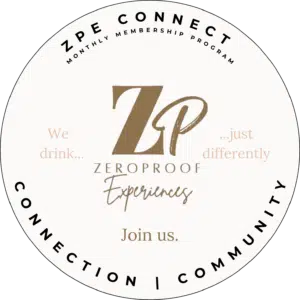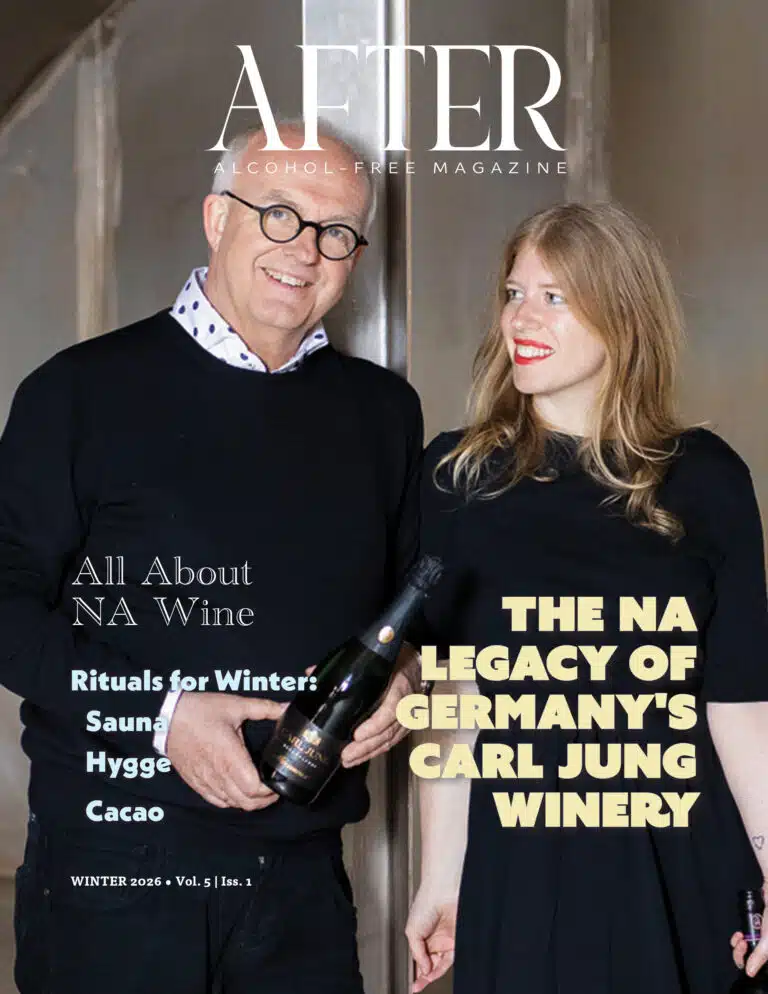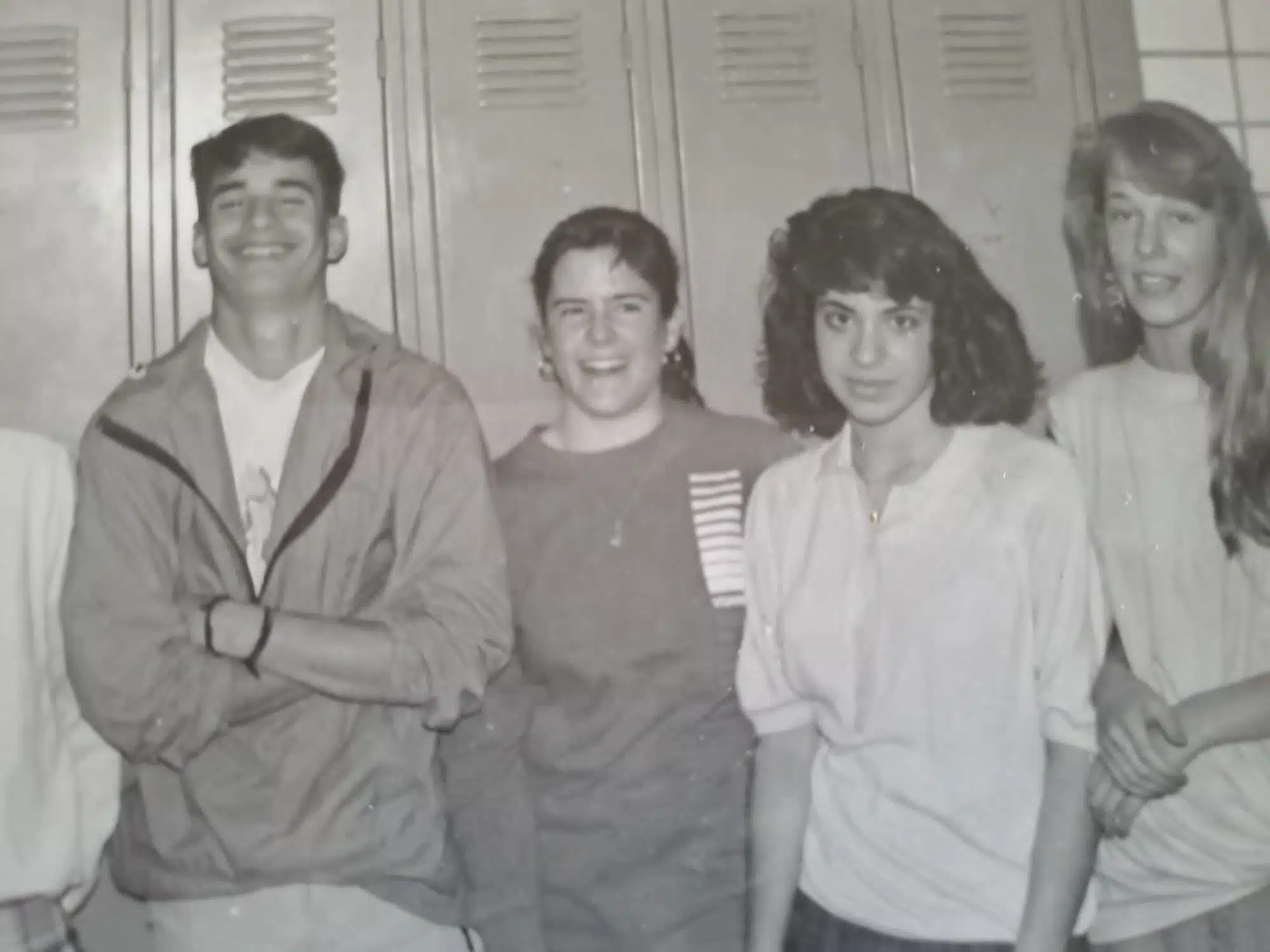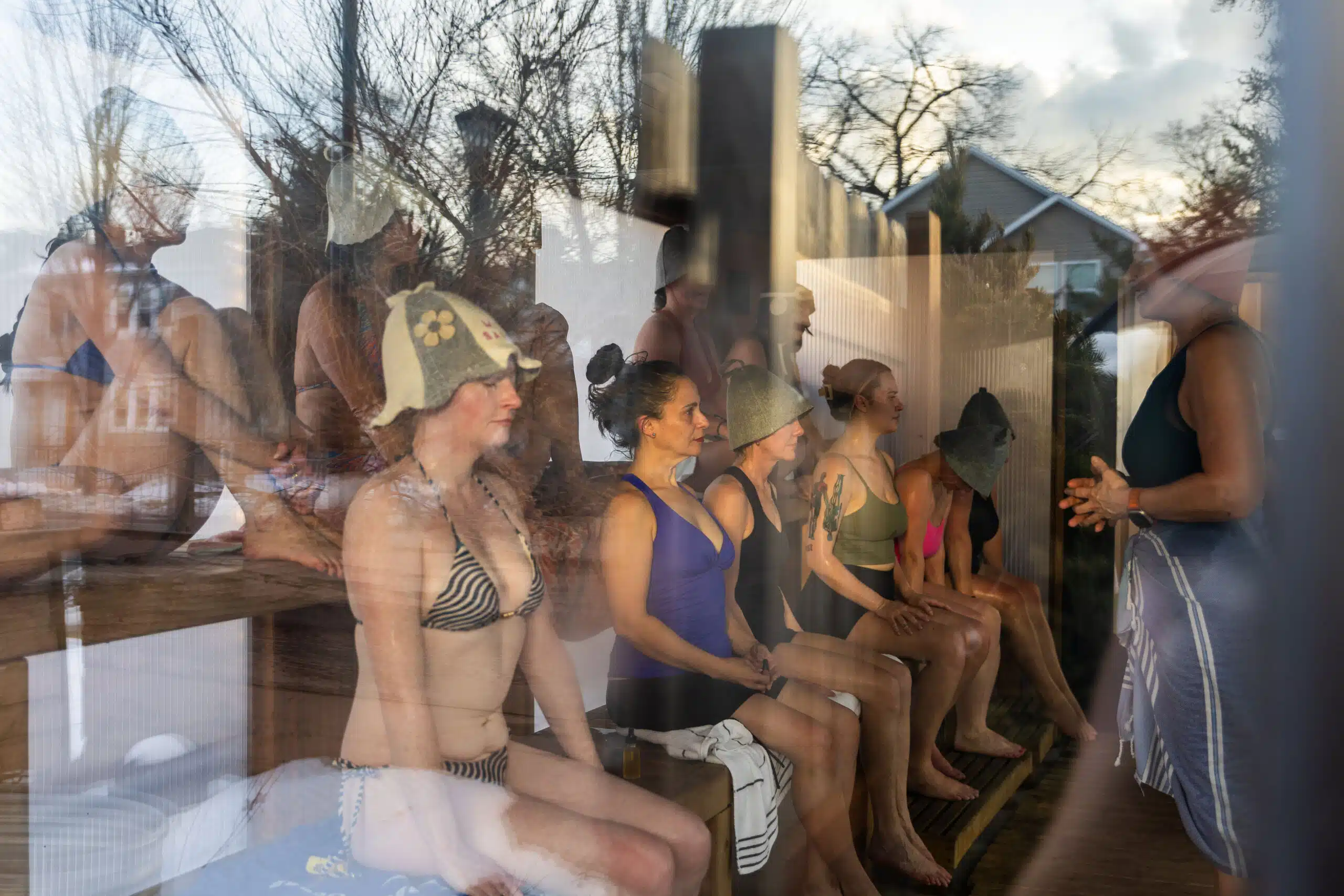Interview edited for space and clarity.
Photography by Cole Streelman
We sat down with Susie Streelman—founder of Zero Proof Experiences and host of the popular Sober in the City weekend retreats—to learn about how she has built her sober community, what inspires her, and what’s coming next.
Nicole Pietrandrea Hough for AFTER Magazine: I’m very happy to be here with you today, Susie! Last time I saw you we were dressed all in pink in Tampa [for the Zero Proof Experiences Sober in the City, Tampa flamingo themed evening].
Susie Streelman, founder of Zero Proof Experiences: That is a nice memory! I’m so glad that you got to come and experience an alcohol-free weekend with us.
N: It was wonderful. I was happy to have a break from my normal routine, and it was inspiring to be around 100+ enthusiastic alcohol-free people.
S: It really was. A few more than 100 women and a few brave men!
N: True, brave men to hang around with that many women all dressed in pink!
Let’s talk a little about how you got there. Would you tell me about your story, how Zero Proof Experiences came to be, and how it all started?
S: [Zero Proof Experiences] was conceived a little over two years ago. I had been alcohol-free for a little while at that point. CNN was telling us that Dry January was becoming popular, and yet I could not find a mocktail when I was out at a restaurant or a bar to save my life. I was really enjoying my alcohol-free lifestyle and I was motivated to continue, but the social discomfort was a pretty big thing for me. I was finding the biggest disconnect was in that social aspect—going out and trying to order something special to have a nice social experience and sometimes being literally laughed at, and I mean by everyone—by friends, by servers, everyone.
I had the idea to create a social group [to ease this discomfort] so I quietly hosted a luxe alcohol-free dinner here in downtown Long Beach, California, my hometown. That was January 2022, and we had about 45 women attend. That little dinner grew into a weekend experience and just two years later we’re hosting our seventh Sober in the City weekend retreat. We were just in Tampa this past February for a really fun weekend and we’re going to Seattle in September.
N: So you created the thing you wanted to see in the world.
S: Yes. I have a passion for travel that I refer to as my travel “problem.” Since I graduated high school and I got to go to Hawaii for the first time the travel bug has been there. Of course, at different stages in your life, you do that in different ways, but it’s a key value for me and I know it’s a big hiccup for a lot of people when they’re considering an alcohol-free life. When they’re starting out they may be skipping social events like dinners out or meeting their friends for happy hour. That might be okay for a time, but for me personally, I didn’t want to miss out on special occasions or on travel opportunities, and I didn’t want to feel awkward.
So we set up some of these events starting with that dinner and then we kind of slowly added to that. We hosted a dinner in Sacramento and my friend and partner Peggi Cooney, who wrote This Side Of Alcohol, suggested adding a meet-and-greet Friday night for anyone traveling solo to start off the weekend. We held the meet-and-greet in Peggi’s hotel room and 75 people showed up. I think people appreciated not having to show up alone to a dinner event where they might not know anyone else. We did the meet-and-greet again [at our second weekend event] in Austin, TX and that time we wanted to add a local event. That was super fun because of course Chris Marshall [of Sans Bar] is there and he hosted us Friday night for a karaoke and dance party. And then we met another gal who led a dopamine dance class for us on Saturday. We added a few breakout sessions like journaling and got some good feedback on that. At that point we realized we needed to be a little more organized.
N: It sounds like this all happened very organically. You saw a need and then you kept adding to it and people were excited about it.
S: That’s true. A lot of it really has been about taking the first step, and then taking the next step. If you think about two years ago, when we had that dinner, I didn’t know that this was what it would be. We’ve met a lot of people who have stepped in to provide resources, give us advice, and help us plan more activities. So that’s kind of how we started and a bit of how we’ve grown and added more activities and more weekends.
N: When you give up alcohol, it feels like your life gets so much smaller. People even tell you that’s how it’s going to be. I think you’re doing a lot to show that that’s not the case.
S: I believed that my life wouldn’t be complete without alcohol. That didn’t even make sense. Why would that even be a consideration? I thought I wouldn’t be able to sit and enjoy a sunset without alcohol. I thought I wouldn’t be able to go on a wine-tasting trip. I thought I wouldn’t be able to go to an all-inclusive resort in Mexico.
N: So where do those beliefs come from? I mean, I felt the same way. Why do we believe we can’t go anywhere tropical? Can’t watch the sunset? How is this so ingrained?
S: Things have changed a lot but our society is still pretty alc-centric. I’ve done all of those things that I mentioned [since I stopped drinking]. I’ve been to an all-inclusive Mexican resort for instance. A lot of them don’t have great options, but there is still something there for everyone. You can also bring your own NA beverages to add to their little alcohol-free margaritas. I think the biggest thing, frankly, is practice.
N: Practice does help, for sure. You do get used to it. In the beginning, people explicitly said things to me like “You’re no fun now,” or “Why even go to a party?” It’s like well, I like food. I like people…
S: Right, honestly, I’ve gone on wine-tasting outings a few times and I’ve been asked why I would want to come wine-tasting? I’m like, “Well, maybe I want to spend time with you. Right?”
N: …and it’s a nice environment, and…
I just shake my head sometimes. This has really been a lot of fun to me. I’m very grateful to the people that have come ahead of me like Chris [Marshall] because if I’m honest, I don’t think I could be here without what they created first. So I’m very grateful for that.
S: .. and a sunny day, a beautiful afternoon… For what it’s worth, I do think [wine tasting] is more challenging than a lot of other trips. It’s so focused around the wine and there are typically not a lot of extra options besides water, maybe in a nice glass. Occasionally, they have something alcohol-free and I get very excited. I went to a winery in Walla Walla, WA called Waterbrook that has a beautiful location and they offer an alcohol-free wine. That’s what needs to happen. I mean, almost every group has a designated driver. Right? So there must be a market for this.
I think it’s coming, but it’s still true that so many activities, whether it’s a celebration, whether it’s a funeral, even after a yoga session, involve alcohol. I’ve seen yoga workshops hosted at a local brewery with a happy hour afterward. There’s a brewery in Long Beach that offers an alcohol-free beer. I just think our world still promotes cocktails over mocktails
N: Just that you see that at all is a good sign. It is changing…
S: It is. I think you and I both can see that it’s going to change rather quickly. I recently read a survey that said that 40% of people surveyed were interested in booking a detox trip this year. That’s a huge number. If you think about all your friends that seems really high. When they asked how many are interested in alcohol-free options at a hotel, the number went up to 60%. Those kinds of numbers excite me.
N: That was one of my questions for you because I know you love statistics. That really is exciting. I mean, that’s an enormous segment of the population.
S: So that doesn’t necessarily mean that those people want to go completely alcohol-free, but wouldn’t it be nice if we could all feel empowered in our choices? And I can also say just personally, the temperature is definitely changing out there. It varies a lot from region to region. In your area and the New England states there’s a higher percentage than we have here in Southern California. I read in a study maybe a year ago, they gauged interest in Dry January by state and some of the highest ones were Vermont, Massachusetts, New Hampshire. I feel like [the New York area and] those New England states are getting more mocktails suddenly on the menu. I used to be told the strangest things by waiters, you know, like, “We can’t do that, it’s premixed.”
N: I’m always so sad when they say that.
S: Right? It’s either premixed or they say, “That won’t taste good.” Or they say the best we could do is like a berry lemonade. For a long time I had this rather specific order that I would order which is essentially a very light alcohol-free margarita. I even made up some cards so I could hand it to the water to make it less painful? Lately though, the last few times that I’ve been out, I’ve said “Hey, could you make me an alcohol-free margarita or an alcohol-free mojito?”and the response I’m hearing is, “Sure we’ll be right out with your mocktail.” No questions asked. I felt like we’ve been slower to come along [in California] and it’s picking up speed now.
N: It’s starting to. I still see a mix of responses even in New York. It really depends. I see a lot of really nice menus [in the city] and I’ve been going upstate [NY] a lot. There are some great mocktails on menus up there. Then the other extreme is either there’s nothing at all or maybe a Heineken Zero which has kind of replaced O’Douls as the sole item on the menu. But I’m glad to at least have something. I don’t get as much snarkiness as [a few years ago] or people asking me if I have a problem.
So this ties back to exactly what you’re doing, which is helping people navigate the AF world and feel comfortable. I see these 110 women and a few brave men come together and there’s this sense of inclusiveness and relief. You see yourself in someone else and you know you’re part of something. There was a sense of exuberance the whole weekend. It’s really amazing to witness
S: It’s true. Have you ever been to a party, and you’re looking around to see if anybody else is maybe going alcohol-free that night? Or maybe been out to a restaurant. I’ve noticed that if there’s just one other person who is also not drinking? It does feel better.
N: That’s true. It’s a human desire to fit in and not be the only one who’s not doing something. We’re wired genetically to be part of the pack for safety and this is a leap out of safety socially.
S: Nobody wants to be the only one with the big water glass while everybody else has a sexy cocktail glass or a wine glass.
N: It does also have a lot to do with the glass. I feel much better with a martini glass than a water glass no matter what’s in it.
S: I think it is quite important. And I have quite a variety at my house.
N: So you mentioned Peggi [Cooney] earlier. Let’s talk about Peggi for a minute. Peggi is your Chief Connection Officer and she’s so wonderful. At what point did you bring her into Zero Proof Experiences and how did you decide that “Connection Officer” needed its own role?
S: That’s a great question. Peggi showed up at our very first event here in downtown Long Beach. I was pretty enamored and very excited to meet her because I knew that she had just come out with her book, This Side of Alcohol, and she had a growing private Facebook group. I just couldn’t believe that she was coming to our event. Then in talking to her and some of her friends we decided she would be the keynote speaker at the next event. When Peggi comes alongside you and works on a project, she really shows up. We had so much fun planning together that by the time we got to our third event in Austin, Texas. I think we walked in and she said to me, “You know what, this is really all I want to do,” and I was like, “Wow, that would be great.” So we’ve really been connected and working together [from the beginning] and she connects with a lot of people. It’s been a lot of fun to work with her and meet more people through her. We have very different backgrounds. She’s a social worker and she would probably tell you that her drinking story is a bit heavier than mine. I think we bring a nice balance to the team. There’s so much synergy in finding people who you enjoy working with. She’s just great, and you can call her up or send her a text and say, “What do you think of this?” “Is this a good idea?” because this alcohol-free space is a whole new world. I’ve met a few people who have been alcohol-free for a long time who really didn’t have any idea that all of us were here on Instagram [talking about these things], running events, making a magazine. There are still a lot of people that don’t know about this.
N: That’s true. I forget that occasionally because we’re so immersed in it, and then I remember there’s still a lot of work to be done. I think we have a similar mission in the sense that we want people to feel a part of something and want them to know they’re not alone.
S: Absolutely. If you want to choose an alcohol-free lifestyle, or even if you just want to take a break for a night or for a week, you should feel absolutely 100% like that’s a valid choice, that you can feel empowered in that choice, and that you can actually make friends [who support that choice]. It’s amazing
The only thing that I didn’t see coming was that this was going to be so popular
N: Tell me numbers. I like to hear these statistics!
S: I read an article last week that said keyword searches for nonalcoholic gin went up like 580% in 90 days. Searches for nonalcoholic beer went up 472%. I did not foresee that this was going to be so trendy. I mean, maybe we should have because we were interested in it but the numbers are huge.
The other thing that I didn’t expect is to meet a bunch of really cool women who are interested in personal growth and who are creating a better self. I’m at an age where people aren’t making a lot of new friends, typically, so I didn’t expect that.
I just shake my head sometimes. This has really been a lot of fun to me. I’m very grateful to the people who have come ahead of me like Chris [Marshall] because if I’m honest, I don’t think I could be here without what they created first. So I’m very grateful for that.
N: Those are some wonderful people. And now I think you fall into that category!
S: There’s a lot more coming up. I poked around for quite a while [before I started hosting events]. I don’t know about you, but this decision did not come overnight for me. It was probably at least a dozen years where I was considering it. I was always pretty interested in health, fitness, and nutrition so when my doctor told me that my liver enzymes were a bit high and said I should cut back for a while I started analyzing my habits more carefully. Then it kind of stuck because I was interested in what this meant for my health. So I took a bunch of breaks, little breaks like a month. I did two Lent seasons, which I thought was a very extreme length of time, but I never considered that I would stop. In fact, I never considered completely stopping drinking alcohol until I took a month break.
N: So what changed at that point?
S: Well, because I had poked around before and I even remember seeing Chris Marshall, like that guy that was doing this thing back in 2017. I was watching very quietly from the sidelines while I was taking that occasional break, but I never had any fun with it. I took the break but I was quiet about it. I was just trying to do the healthy thing or sometimes I took a break because I was training for a race; I did some half-marathons and a few full marathons. Then I started to think maybe I was training for the races so that I would cut down my alcohol intake. I wasn’t really sure anymore.
N: Those are the games we play with ourselves…
S: Yes. When I was just taking those breaks, I was like, “All right I’m not going to have any beverages this week. I’ll save it for this party or I’ll save it for the bridal shower [this weekend].” It could be anything. Then during the pandemic, I got connected with Sober Sis. That was one of the first [official] things that I did, and I met some people who felt similarly to how I felt. That’s what actually made it fun, meeting other people.
Like you, during the pandemic I got just a little tired of drinking more and eating more. So I was done. I was on my detox session and when it was done I signed up for a longer class. When I got to four months, I thought, ‘Man, I’ve never done this for so long, I think I might keep going.” It was probably around six months when I realized that I had not understood how much space alcohol was taking in my head, wondering what is the appropriate number of beverages to consume while you’re cooking dinner, when you’re out for brunch, after shopping, when you’re just relaxing at home, or because it’s the weekend. I was constantly doing math in my head like, “Do I do this?” “Is this alright?” It’s tiring. I didn’t realize just how tiring it was until I stopped doing it.
N: Agreed.
So can I ask you: I know the word “sober” has a lot of nuanced connotations. Do you call yourself “sober?” Or how do you identify?
S: I don’t call myself “sober.” I’m happy if you do or your friends do, but I call myself “alcohol-free.” The longer time goes on, it doesn’t really bother me so much anymore if somebody calls me “sober.” There are a lot of connotations and words can carry stigma but I’m happy to be part of that conversation. Do you call yourself “alcohol-free?”
N: I’ve started to use the word sober more. I kind of use it interchangeably, but I didn’t say “sober” for the first few years. I also didn’t use the word “alcoholic” and now I do, or I use the term “alcohol use disorder.” There is a lot of stigma connected to these words, but if I’m really being honest with myself, I had a bit of a problem. The stigma is coming from other people, of course, and I think the more we can educate those people, the better. I’ve heard Chris Marshall say that we have to claim the word “sober” and embrace it. And as people in the industry embrace the “sober serious” not just the “sober curious” who tend to get more attention.
S: Yeah, I do believe that it doesn’t matter so much where we fall on that continuum of alcohol consumption. As you’re probably very well aware, your next-door neighbor who seems super normal could have been in rehab last summer. Your colleague that you meet for happy hour or dinner who always drinks water, he may be 12 years in AA. Your fun friend might go home and Google “Am I an alcoholic” and might be struggling. I think we’re all looking for a connection with like-minded individuals, at least some of the time, because to me that can really build up confidence to tackle these things and the support and ideas to know what to do.
N: It’s such a good point you’re making though. It really does not matter. You’re trying to make your life better, and feel better and you [deserve to have support and connection].
S: Sometimes it’s a pretty fine line between maybe somebody that’s drinking a lot and functioning very well and someone needing to go to rehab or needing to do something more serious.
N: I do think a lot of people are grappling with that and trying to figure out where they stand. Whenever I’m out, if I mention [AFTER] people immediately start telling me about their drinking habits and whether they think they drink too much. They start kind of circling around the subject to get some feedback. I don’t feel like it’s my place to give an opinion but I just listen. I think there are a lot of people who are uncomfortable with where they are with their drinking.
S: It’s true I get both reactions. I mean, a lot of times people will tell me how very little they drink and how they could completely do without it like no big deal. And I think sometimes people might feel embarrassed if they’ve been talking a lot about drinking or about bars. I don’t really care, you can talk about bars.
N: It’s a private decision, ultimately. Right?
S: Right. Yeah, it is. But I will be your booze-free, buddy.
N: Exactly. When you’re ready. We’re here. There’s a group of 110 women and a few brave men ready for you.
So tell me what is your vision from here? I know you have an event coming up, and besides that what’s the grand vision going forward? A lot has happened within a short time.
S: A lot has happened in a short time. This year has been non-stop ever since Dry January. We’re trying to offer even more connection opportunities in 2024. We would like to inspire more people to feel empowered [to try not drinking]—whether that’s a short period of time or a long period of time—so we’re adding a little bit more to our program.
Of course we still think alcohol-free travel is really exciting. That has a big place in my heart so we make that super easy at our Sober In The City weekends. We have all these activities and alcohol-free beverages galore from our beautiful sponsors.
I also talk to a lot of people [in towns and cities across the country] who haven’t connected with anybody locally. So in January, we had a couple of local meet ups that all happened at the same time locally—just very casual. Low entry. One was at a coffee shop, one was at a nonalcoholic bottle shop. And local organizations have stepped up to partner with us. We will do that anywhere someone wants to have a meetup. We’ll do it anywhere and we’ll partner with you to help people make local connections, and help build the alcohol-free community. So we have a couple in the works in Seattle, in Spokane and in Arizona. If someone reaches out and says I’m interested, you know, chances are we might know a couple other people in that same area and that’s just how it starts.
We’ve also created a membership program called Zero Proof Connect. We meet twice a week for connection calls. We have a lot of guests, in fact I know you’re going to be one of our guests [around the time this issue is coming out].
N: Yes, I can’t wait!
S: So we’re just growing into all of that. We have some [Sober in the City] locations planned for 2025. We are going to Bali in June [2024] and we just have a vision of more connection. Our goal—Peggi’s and mine— is to support the alcohol-free community at large, and I think it’s wonderful all the things that we’re able to offer.
N: I just love what you’re doing. It’s addressing so many different needs and bringing a lot of joy to people.
So, our last question is always this: We believe the best life begins AFTER saying goodbye to alcohol; what has your AFTER looked like?
S: My AFTER has looked like more, not less. More friends—I still connect with my friends and family and I made so many new friends. I have been more social since going alcohol-free. Probably more travel too. And definitely more connection overall.
N: That’s amazing. And you’ve created something extraordinary.
S: It’s been so fun to meet you and work with you and be able to share life with you too. I definitely look forward to more of that.
N: I’m really glad to be part of it. Thank you for being here with me and I’m excited to do this summer issue with you!
S: Thank you so much, Nicole.
***
Find Susie Here:


Other resources mentioned in this interview:





